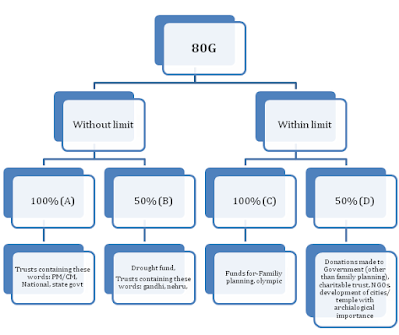How to obtain 80G Registration?
 |
Procuring an
80G registration for your non-profit organization can grant the donors a chance
to avail tax deductions on donations. Additionally, obtaining 80G Certificate
can also help increase the total count of donations your non- profit
organization collect. This article all about 80G Registration and the
advantages of holding an 80G Certificate.
What is 80G Registration?
Procuring an 80G registration for your non-profit organization can grant the donors a chance to avail tax deductions on donations. Additionally, obtaining 80G Certificate can also help increase the total count of donations your non- profit organization collect. This article all about 80G Registration and the advantages of holding an 80G Certificate.
What is 80G Registration?
80G
Registration or 80G Certificate is a certificate that allows the people making
donations in your organization to avail tax deductions under Section 80G of
Income Tax Act, 1961. Furthermore, religious charities or angel businesses are
not generally issued an 80G Certificate. Moreover, gifts made to or trusts that
are operating outside India or foreign trusts are not eligible for tax
deductions.
Benefits of 80G Registration
Getting 80G registration has many advantages which are
discussed below in detail;
- Attract more donors: Obtaining 80G registration attract more donors as they get tax deductions under Section 80G of the Income Tax Act
- Tax benefits: Also, you are provided with various tax benefits when your institution is registered under Section 80G
- More access to funding: Furthermore, the chances for your trust to raise funds increases when you hold 80G registration
Deduction percentage under Section 80G
Deductions
are provided to the taxpayers in some percentage as prescribed by relevant
law.
- Donations made to Prime minister relief fund is eligible for 100% deduction under section 80G without any upper limit
- Payments made to trusts like “Indira Gandhi memorial trust” is suitable for 50% deduction without any specified limit
- An approved institution, i.e. institutions encouraging and promoting family planning is eligible for 100% exemption under section 80G
- Any charitable trust that is included in the list is suitable for 50% deduction under section 80G
Documents required to claim deductions under Section 80G
The
documents required to register under Section 80G of the Income Tax Act are as
follows;
·
A
copy of PAN Card (NGO)
·
Duly
filled Form 10G
·
Trust
Deed / MOU
·
Summary
of welfare activities carried in the preceding 3 years
·
Balance sheet and
books of accounts of the previous 3 years
·
List of donors
along with their address and PAN
·
List of the
governing board of trustee’s members with their contact details
·
Original
Registration Certificate
For Proposed Registered office
(Residential or commercial)
·
Any Utility bills
·
Scan copy of Rent
agreement with NOC from owner
Mode of payment eligible for a tax deduction
Not all form
of payment is qualified for claiming tax deductions under Section 80G.
Furthermore, only a specified method of payment is allowed for the deductions
which are as follows;
- Donations made in the form of gifts do not qualify for tax benefits
- Also, the donations made in kind will not help you with tax benefits during a disaster such as floods, earthquake
- Contributions deducted from salary can be claimed by providing the receipt received at the time of payment
- Only donations made in cash or cheque qualifies for a tax deduction
Necessary Compliance requirements for 80G registration
The applicant
of the 80G registration must comply with the following conditions;
- An
application can only be made by registered societies, public charitable
trusts, recognized educational institution or any institution funded by
the Government
- The
institution or trust applying for the certificate must be duly registered
under the Societies Registration Act, 1860, Section 25 of the Companies
Act or under any other relevant laws.
- Applicants
of the certificate must not correspond to any religion-based or caste and
creeds based activity.
- The
donated funds received by these trust/ institution should only be used for
charitable purposes
- The
registered trust should not hold any income which is not exempted
- Institutions
pursuing any other businesses side- by- side are required to maintain a
separate book of accounts so that the received donations are not confused
with savings of any other kind
- The
applicant should manage an appropriate record of annual returns, accounting
and bookkeeping before applying for the certificate.
- Finally, the recipient of the certificate must make sure that they renew their certificate regularly.
Procedure for 80G registration
You need to follow the following steps to obtain 80G Registration for your trust/
institution;
- You need to submit the application to the Commissioner of Income Tax along with necessary documents
- Then, the Income Tax officials conduct an On-premise inspection after successful submission of application and documents,
- Furthermore, the department officials may ask for additional
documents or evidence if they feel the need
- Finally, after successful verification of the premise and the documents, the 80G Certificate is granted to the institution
Issuance of 80G Certificate
After
receiving the application, the Commissioner passes a written order upon
successful verification of the application which would effectively register the
trust under Section 80G of the Income-tax Act.
Additionally,
the Commissioner may ask for further documents from the applicant if the need
for the same is felt, or reject the application in the worst case. Moreover, the
registration accorded to the trust is legitimate for a period of one-three
years.
Conclusion
Obtaining
80G registrations is supportive to you in many ways; i.e. it helps attract more
donors, grows trust and helps raise fundings from the Government. Also, it aids
the people who make donations to your trust to avail some or all part of the
donation made. Basically, it is a win-win situation. Corpbiz



Thanks for Share Valuable Information.........BIS has 5 provincial authorities and 19 branch agencies. The provincial agency directs the comparing branch department. BIS India Registration research centers and some autonomous labs are liable for the examination of tests taken during the item affirmation measure.
ReplyDelete